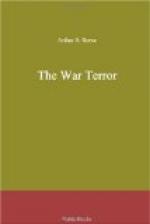“What was the poison?” I asked. “Have they found out yet?”
“They are pretty sure, so Minturn told me, that it was lead poisoning. The fact not generally known is,” he added in a lower tone, “that the cases were not confined to the Pearcy house. They had even extended to Minturn’s too, although about that he said little yesterday. The estates up there adjoin, you know.”
Owen Minturn, I recalled, had gained a formidable reputation by his successful handling of cases from the lowest strata of society to the highest. Indeed it was a byword that his appearance in court indicated two things—the guilt of the accused and a verdict of acquittal.
“Of course,” Craig pursued as we were jolted from station to station downtown, “you know they say that Minturn never kept a record of a case. But written records were as nothing compared to what that man must have carried only in his head.”
It was a common saying that, if Minturn should tell all he knew, he might hang half a dozen prominent men in society. That was not strictly true, perhaps, but it was certain that a revelation of the things confided to him by clients which were never put down on paper would have caused a series of explosions that would have wrecked at least some portions of the social and financial world. He had heard much and told little, for he had been a sort of “father confessor.”
Had Minturn, I wondered, known the name of the real criminal?
Josephson’s was a popular bath on Forty-second Street, where many of the “sun-dodgers” were accustomed to recuperate during the day from their arduous pursuit of pleasure at night and prepare for the resumption of their toil during the coming night. It was more than that, however, for it had a reputation for being conducted really on a high plane.
We met Josephson downstairs. He had been released under bail, though the place was temporarily closed and watched over by the agents of the coroner and the police. Josephson appeared to be a man of some education and quite different from what I had imagined from hearing him over the telephone.
“Oh, Mr. Kennedy,” he exclaimed, “who now will come to my baths? Last night they were crowded, but to-day—”
He ended with an expressive gesture of his hands.
“One customer I have surely lost, young Mr. Pearcy,” he went on.
“Warner Pearcy?” asked Craig. “Was he here last night?”
“Nearly every night,” replied Josephson, now glib enough as his first excitement subsided and his command of English returned. “He was a neighbor of Mr. Minturn’s, I hear. Oh, what luck!” growled Josephson as the name recalled him to his present troubles.
“Well,” remarked Kennedy with an attempt at reassurance as if to gain the masseur’s confidence, “I know as well as you that it is often amazing what a tremendous shock a man may receive and yet not be killed, and no less amazing how small a shock may kill. It all depends on circumstances.”




